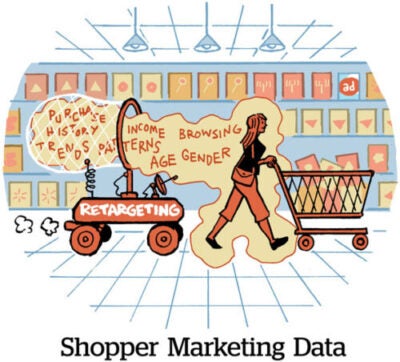
Right here’s right now’s AdExchanger.com information round-up… Need it by e mail? Join right here.
Swiftly Goes The Retail Lengthy Tail
The retail media startup Swiftly raised $100 million, on prime of $20 million raised since 2019. It’s an eye-popping quantity, regardless of no valuation, and can cheer different retail promoting startups that hope smaller chains can seize the Amazon alternative.
Swiftly’s co-founders beforehand began Symphony Commerce, an ecommerce administration tech for giant CPG manufacturers. After Amazon’s acquisition of Complete Meals, retailers began reaching out to create their very own on-line platforms. “We regarded on the house on the time and thought, ‘Effectively, gosh, this can be a huge market alternative,’” Henry Kim, Swiftly’s co-founder and CEO, tells AdExchanger.
Amazon is the go-to retail promoting instance … $31 billion in a yr will try this. Walmart and Goal additionally just lately disclosed advert income for the primary time, clearing $2 billion and $1 billion, respectively.
The query is whether or not regional and even smaller nationwide chains can capitalize.
Swiftly works with retailers comparable to Household Greenback and Save Mart Supermarkets. Go to a Household Greenback, Save Mart or any Kroger banner and also you’ll be amazed at what number of buyers use a cellphone quantity at checkout, Kim says.
Digital media would kill for these e mail submission charges.
Brick-and-mortar is accustomed to taking part in protection, at the least in comparison with ecommerce, which is all the time on the assault. However retail tech may be “democratized,” in accordance with Kim. “What brick-and-mortar retailers have may be very troublesome for bigger, pure-play ecommerce retailers to compete with,” he says.
AMP Unplugged
Enthusiasm for Google AMP is waning (to say the least).
New survey outcomes commissioned by the publishing commerce org DCN level to flagging religion in Google’s Accelerated Cell Pages (AMP). The bulk (96%) of reports publishers at present use or have used Google AMP – however 57% are reevaluating its use and 48% have both stopped or will quickly cease utilizing it solely, in accordance with a survey of DCN members performed this yr.
DCN member pubs say they adopted AMP for quicker load occasions and the promise of higher search outcomes.
One of many fundamental causes behind the migration away from Google AMP is rising mistrust of Google’s affect and techniques. Lately unredacted courtroom paperwork from Texas’s antitrust case towards Google make clear how the corporate (allegedly) tampered with public sale dynamics and artificially boosted AMP outcomes by deprioritizing non-AMP hyperlinks and allegedly even throttling non-AMP website hundreds.
The Wall Avenue Journal reported final month that Vox Media, BuzzFeed, Advanced and BDG are testing their very own mobile-optimized web page options to section out dependence on AMP. Primarily based on these DCN survey outcomes, that listing is simply set to get longer.
Altering The Channel
Again within the day, an leisure studio gross sales chief would distribute content material to owned-and-operated networks and channels like DVD sellers, Blockbuster and iTunes. If a present was syndicated to different channels, all people obtained wealthy.
Now the job includes promoting content material “throughout a mess of companions,” in accordance with Mark Garner, EVP of worldwide content material gross sales and enterprise improvement at A+E Networks, talking to Digiday. And that’s underselling the phrase “multitude.”
Studios with exhibits in manufacturing and useful content material libraries are determining a sophisticated calculus that includes subscription stickiness, licensing versus ad-supported or subscription income, new aggressive tensions, together with inside an organization, and shifting dynamics in the case of what folks watch on-line.
One A+E present, “Kings of Ache,” for instance, which chronicles ache tolerance charges in several nations, was a dud on the Historical past Channel and would have been canceled after one season, Garner says. Nevertheless it took off with digital viewers and is now produced particularly for streaming media.
Broadcasters have additionally shortened distribution deal phrases. Studios as soon as most well-liked longer phrases, which meant dependable earnings. Immediately, they’re extra inclined to chop brief offers in case a present occurs to explode on Netflix or Amazon Prime and, impulsively, immense worth begins accruing to their co-opetition.
However Wait, There’s Extra!
Shopify launches Linkpop, a “hyperlink in bio” software with shoppable hyperlinks for social creators. [Coywolf News]
Apple has to strive tougher now. [NYT]
WideOrbit and Comscore develop on efforts to automate linear TV promoting. [TV Tech]
Ampersand amps up its TV advert concentrating on information options for native campaigns. [B+C]
Stagwell’s excessive This fall earnings have been pushed by $75 million in new enterprise. [Adweek]
You’re Employed!
Outdoors Interactive names its first chief content material officer, Amy DuBois Barnett. [release]
DeepIntent expands its workforce to give attention to pharma’s CTV promoting shift. [release]






